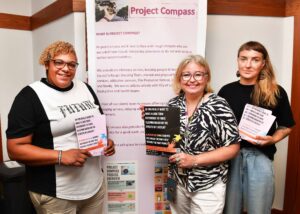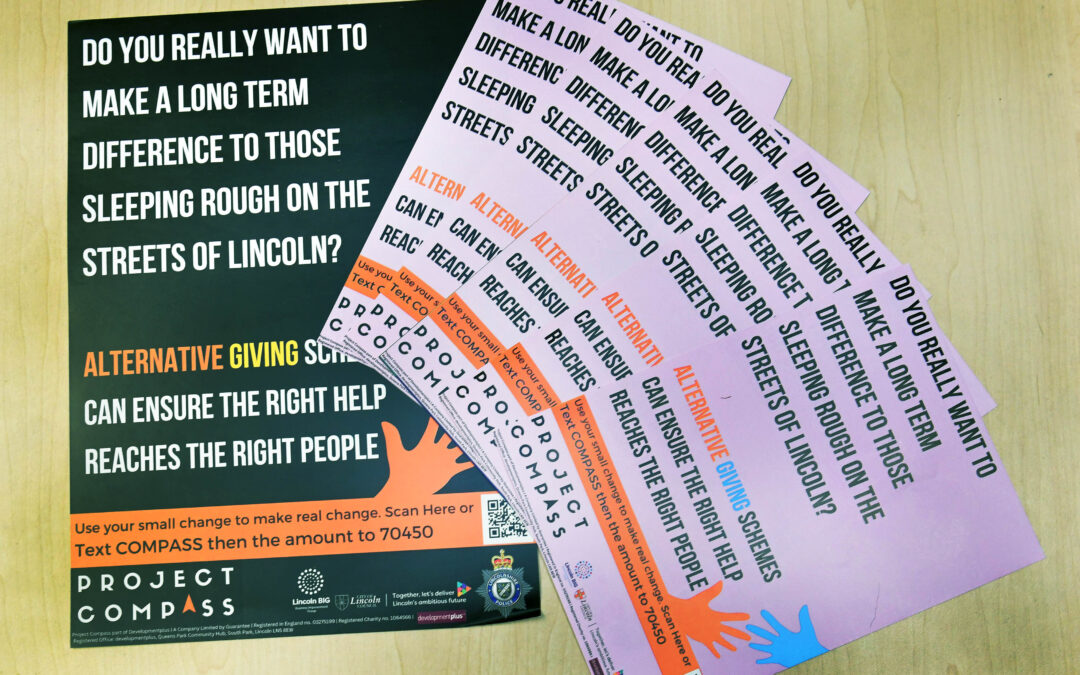Charitably minded people who are keen to help the homeless are urged to take the safe route to making a difference to the lives of “rough sleepers.”
The call comes as Lincoln-based Developmentplus’ Project Compass team celebrates a move to 97 High Street in the city and launches an impactful Alternative Giving Scheme, which promises to help the homeless in numerous ways.
Lead Development Worker Becky Frost said: “We are delighted with our move to much bigger, and higher profile premises and to announce this powerful new initiative. It will give people confidence that their donations will be put to the most effective use – by removing the risk of the money only being of use in the short term.”
The good news comes after the charity learned that crucial bids were successful in securing three-year funding from the Tudor Trust, Mercers and the NHS Lincolnshire Integrated Care Board. This means Project Compass can work in close partnership with Lincoln Business Improvement Group (Lincoln BIG), Lincolnshire Police and the City of Lincoln Council, to offer advocacy and other services to help change lives for the better.
Users of the Alternative Giving Scheme will directly help Project Compass to put a roof over a homeless person’s head (thanks to its connections with Nomad, the Somewhere Safe to Stay hub, Pathways, Corner House and the City of Lincoln Council).
 The scheme will allow Project Compass and its partners to provide person-centred support for their physical and mental health, help them to fill in forms, get GP appointments, provide them with breakfasts and lunches, hot showers, clothing if needed and, importantly, space to talk.
The scheme will allow Project Compass and its partners to provide person-centred support for their physical and mental health, help them to fill in forms, get GP appointments, provide them with breakfasts and lunches, hot showers, clothing if needed and, importantly, space to talk.
“There are people out there who would have you believe that Lincoln has a big homeless problem, but it is nowhere as bad as it was two or three years ago. It is fantastic to truthfully say that,” said Becky. “The real problem is that seeing someone sleeping rough, or sitting in a doorway surrounded by carrier bags, can tug at the heartstrings and passers-by can often feel intimidated and obliged to give them money. However, the giver has no idea who that person is. They don’t know their personal circumstances. They may actually be about to go home! Unfortunately, the lure of money-making can often keep people on the streets and mean that they miss vital meetings and appointments to support them and find them accommodation.” Becky added that people can easily be caught out and feel compelled to hand over money when there is a bout of bad weather or at special times of the year, such as Christmas. Freshers Week, when university students arrive in the city to take-up their studies, is also a time when young people feel the urge to handover small change.
Lincoln BIG Hospitality Manager Marion Cooney said: “As a partner in the Alternative Giving Scheme in Lincoln, Lincoln BIG is thrilled and deeply committed to the initiative’s mission. Lincoln BIG sees this partnership as an invaluable opportunity to make a meaningful and lasting impact where our business community can offer their support by providing an alternative way to give and support those in need. We are honoured to be a part of this transformative project and dedicated to collaborating with other partners, community members, businesses, and beneficiaries to drive positive change and uplift those who require assistance.”
Lincoln City Centre Police Team Sgt Tom Smith said: “A number of agencies come together at Project Compass to help each individual get the support they need. The City Centre Police Team will often attend to engage with and help support the most vulnerable. It is a chance to speak to and offer help to the homeless community in Lincoln. “Having a charity as a one-stop location where individuals can get food and drink, clean dry clothing, arrange meetings and appointments with services is invaluable and amazing. “Unfortunately, some people will “professionally beg,” presenting themselves as homeless and will seek to exploit the publics’ generosity; this could divert away funds which may be spent on illicit substances and not in providing basic needs.

